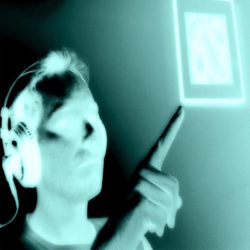So, I’m sitting here trying to revision the concept of “spirituality,” strip it of all religious baggage, and make it accessible to reasonable, critical thinkers for all time. Unfortunately, my knee is aching a bit, so I’ll have to knock this out in the next ten minutes or so. Well, shit, I may as well just Google it then, as I’m sure someone has already figured the whole thing out…
No way! Somebody DID figure it out. And that somebody was ME! Sort of. About seven or eight years ago my friend Steve asked me to write an essay for a book he was editing about the “Spirit of Generation X.” I tried my best to distill my twenty-something wisdom down to its essence, and what I came up with was the concept of “Radical Authenticity.” Basically, that’s my life project, in a nutshell. To be as fully myself as possible, to realize my potential as a human being, to wake the fuck up. So, I Googled the phrase “Radical Authenticity” and lo and behold I made three — count ’em three — amazing discoveries. First, my essay has recently been re-published on some “Integral” website. “How embarrassing!” was my first thought, as my writing style was pathetically imitative back then (it still is to some degree). I even used the word “alas” at one point, which is straight up Ken Wilber at his most pompous. Second, some dude from the Institute of Transpersonal Psychology wrote an entire dissertation on the concept of “Radical Authenticity” and created Radical Authenticity.com. Now I’ll look like a poser for using the phrase, although it seems I coined it first. Lastly, that man-weasel cult leader Andrew Cohen has apparently become fond of using the phrase in recent years (again, post my essay), making it even more difficult for me to reclaim and re-tool the concept.
Okay, maybe “man-weasel” is a little harsh. And although Cohen does strike me as an ego-maniacal cult leader freak, I must admit I like the way he unpacks the concept of Radical Authenticity. Here’s what he says:
[From “The Challenge of Radical Authenticity“]:
There is a battle to be fought between the ego’s investment in image and falsehood and the authentic self’s passion for truth and transparency. Most of us do not have the courage to aspire for true integrity of self and soul. Even those who have deep and powerful experiences of higher states of consciousness, of profound emptiness and intoxicating joy, usually remain terrified of radical authenticity. But if evolution is to occur in a way that is stable and meaningful, radical authenticity is the most important part of the path. The power of your own potential transformation ultimately rests on how deeply authentic you are capable of being, at a soul level, as a human being. Radical authenticity is the ultimate threat to falsehood.
And that other dude really goes all-out in his definition [From RadicalAuthenticity.com]:
The word authenticity comes from two Greek words, “autos,” meaning self, and “entea,” meaning tool or instrument. The word radical comes from the Latin word “radix,” meaning root that goes to the source or center of something’s life (Webster’s New Twentieth Century Dictionary Unabridged, 1979.). Consequently, used together, the phrase connotes that a person is the very best tool or instrument one can be in the world to the extent that one’s actions and very mode of being flow from one’s center, or Source of being.
Additionally, for me there is another key implication in the phrase: Assuming that we all come from the one same Source—and that this is a benevolent and congruent Source—it follows that to the extent that one is radically authentic, i.e., whose actions flow from the very Source of who one is, then the result of those actions serve not only the individual but also all those impacted by those actions . . . at least in the long term, if not the short.
God bless Google. I can hit the sack now that my work is done here. I’ll keep thinking about this tomorrow. Maybe I need a new phrase. Integral Authenticity? Nah, too Wilberian. How about Head the gong? No… Too idiosyncratic (and too cool to pimp out for such purposes).

